Top tips from Irish Americans who are hooked on chasing their ancestors back home in Ireland.
Kate grew up in North Albany, NY, also called “Little Limerick”. St. Patrick’s Day in was one of the most celebrated holidays of the year. Mike grew up in Harrisville, NY in rural Lewis County. A glance at the 1850 U.S. Census for Harrisville reads like a ship log of Irish emigrants headed to Boston or New York Harbors during the Great Irish Famine.
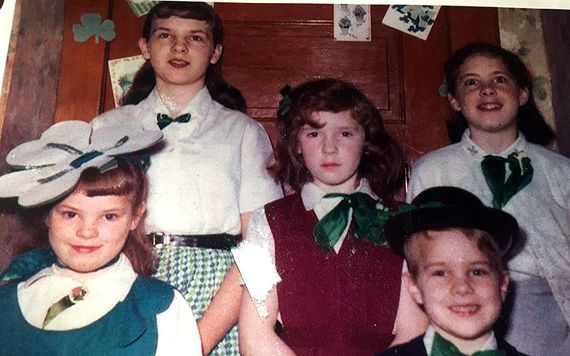
Kate (top right) and her siblings on a St. Patrick's Day long ago in North Albany, N.Y (Little Limerick). An Irish American family indeed!
According to the 2013 Community Survey taken by the U.S. Census Bureau, we are only two of the 33 million Americans who reported Irish ancestry.
We both were raised hearing stories and tales about our Irish American immigrant ancestors. It wasn’t until later in life that we became “hooked” on “chasing” our ancestors back in time to the Emerald Isle.
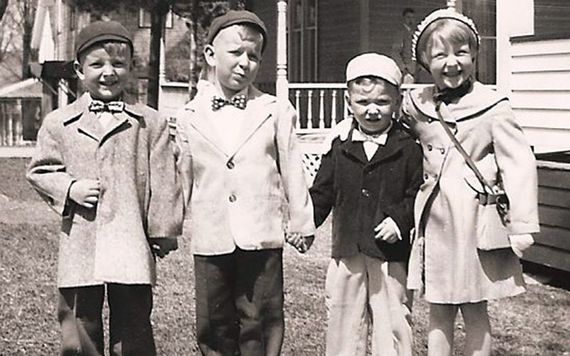
Mike (second from left), his brother Pat (second from right) with their cousins David and Paula on Easter Sunday long ago. Notice the Irish caps on the three boys!
Most Irish Americans begin their search by following one or more ancestry lines.
Kate began by chasing her Fitzpatrick clan and expanded to her Regan and Harney lines.
Mike began by following his Laide line and expanded to his Doyle, Whelan and Kennedy lines.
If you decide to begin “the chase” for your Irish American ancestors, then we recommend you begin with one specific clan and expand out from there. Be aware, it will soon become a lifelong pursuit that will keep you up through the early morning hours on many occasions!
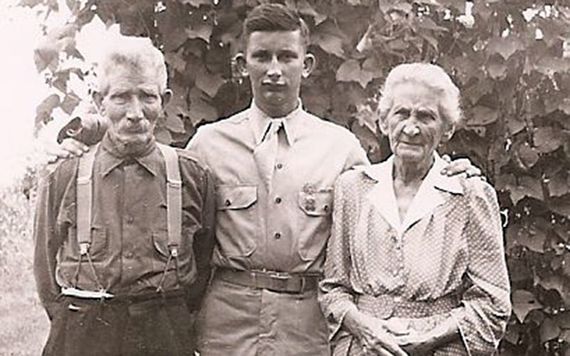
Mike's uncle Dick Lancor with Mike's great grandparents Richard Laide and Jenny Kennedy. If you know who your ancestors were in family photos, then make sure you write their names on the back of the photo!
When we were new to the business, we met with a genealogist who told us that we would be lucky to find the homelands in Ireland of 50% of our ancestors.
Since then, many more Irish records have become available online and the odds of finding the homelands of one’s Irish ancestors has definitely improved.
The most important lesson our genealogist friend taught us was that your search must begin in the U.S!
The more you can find out about your Irish ancestors in the U.S., then the better your chances are of finding where they lived in Ireland.
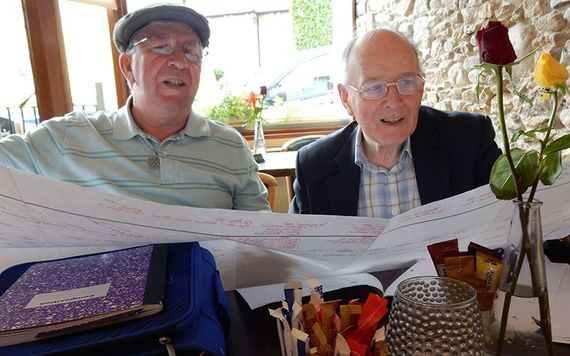
Mike sharing family trees with Kate's distant cousin James Byrne of Kilmolin, Enniskerry, Co. Wicklow.
We have set the stage to help you “chase” your Irish American ancestors. By sharing with you some of the records we have uncovered, we hope to help you learn as much as possible about your ancestors.
There is no better place to start than contacting family members to find out if they have records, photos, bibles or stories they can share. Concentrate on your oldest family members and make sure you keep a record, taped or written, of any information they share. Family stories are so very interesting and enchanting. They may not be totally accurate, but are usually filled with useful bits of information that will point you in the right direction.
The “luck of the Irish” gave Mike access to two family bibles. Both are treasure troves and contain dates of births, marriages and deaths, as well as family photos. The Doyle/Whelan bible contains the marriage certificate for Mike’s great great grandparents James Doyle and Mary Whelan who were married in 1859.
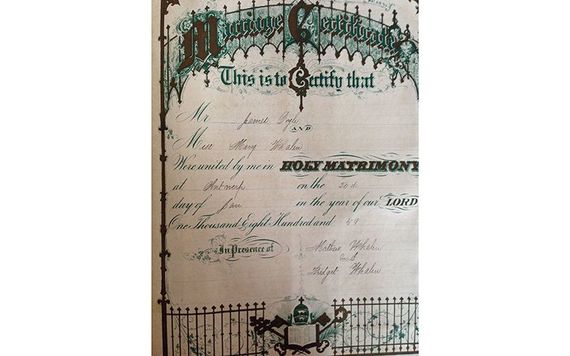
The marriage certificate of James Doyle and Mary Whalen found in a family bible. The two sponsors (Mathew and Bridget Whalen) were siblings of Mary.
The second bible contained photos of Mike’s Irish immigrant ancestors on the Kennedy and Laide sides. Truly unique photos that were not found anywhere else! Mike also inherited a scrapbook put together by his great aunt Grace that contained many, many obituaries and newspaper stories about his ancestors, another treasure trove indeed.
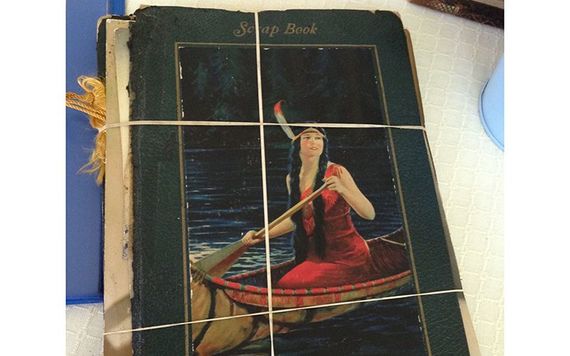
Scrapbook kept by Mike's great aunt Grace filled with obituaries and family history stories. Scrapbooks are treasure troves of family information.
After learning as much as you can by interviewing family members and pouring over family records, then move on to the cemeteries where your Irish American ancestors are buried. Make sure you head out with a good pair of shoes, notebooks, pens, laptop or pad, good camera, sidewalk chalk, a water squirt bottle, and “prayers for and help from your ancestors”.
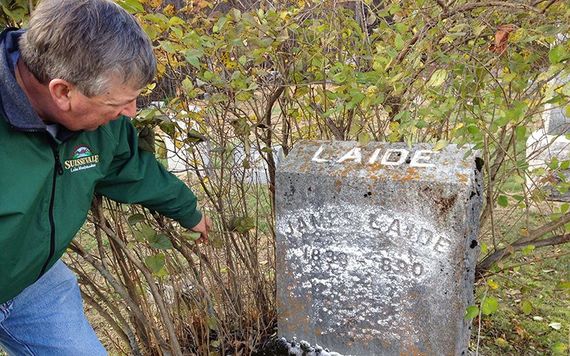
Mike using chalk to highlight his second great grandfather's gravestone that Kate discovered hidden for decades behing overgrown shrubs. When visiting cemeteries, "leave no stone unturned"!
Most of Kate’s Irish ancestors were laid to rest in St. Agnes Cemetery in Menands, NY. Thanks to the fantastic records held in the cemetery office, Kate was able to obtain cemetery plot cards for her ancestors.
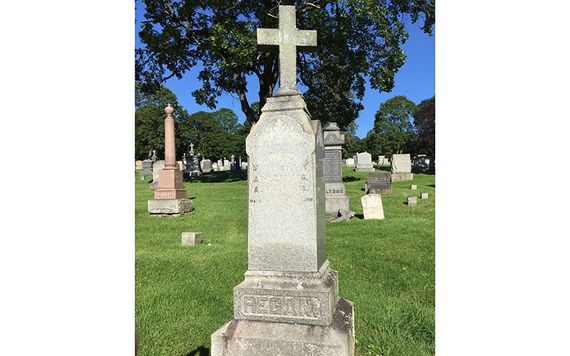
The only name on this gravestone is Kate's second great aunt Johanna Regan (1858-1886), but 18 souls are buried in this family cemetery plot.
After discovering a gravestone with one name on it (Johanna Regan), Kate asked the cemetery’s genealogist for a copy of the plot card. Johanna was the first of 18 of Kate’s ancestors buried in this one cemetery plot between 1886 and 1934. That’s right, 18 souls buried in the plot with only one name on the gravestone! Kate’s immigrant great, great grandparents James Regan and Catherine Walsh are buried in this plot. They had both followed their emigrant children to Albany, NY. Don’t forget to ask for cemetery plot cards!
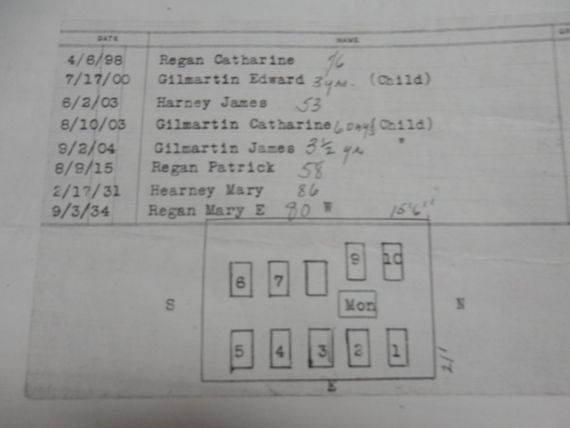
Backside of the plot card for Johanna Regan's gravestone. Kate's second great grandmother Catherine Regan (age 76) is the top name of this side of the plot card.
If you haven’t already done so, you are now ready to begin “chasing” your ancestors online from the comfort of your own home. Start with a simple Google search and move on to the free Family Search website. Start by searching the 1940 U.S. Census (the most recent census available online) and then go back in time (e.g. 1930, 1920). We also recommend the subscription websites Ancestry.com or My Heritage if you decide to go further. On these three websites alone, you will find all types of records including censuses, births, deaths, ship immigration logs, city directories and military records. Submitting a DNA sample to Ancestry.com or some other website will surely keep you up late on many nights as you exchange messages with your DNA matches.
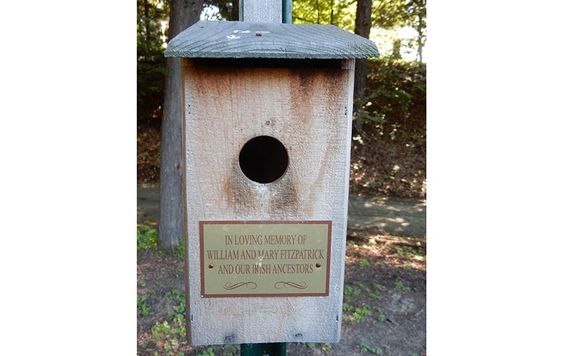
Bluebird house in St. Agnes Cemetery, Menands, NY memorializing Kate's grandparents William and Mary Waters Fitzpatrick and her other Irish ancestors.
Death certificates seldom exist in the U.S. prior to 1880. By 1900, most death certificates included the names of the parents of the deceased and where they were born. Few states have death certificates online, so you will likely pay a fee to obtain a copy from the town or state where your ancestor died. Just do it! You may strike out on some of your requests, but you will certainly find more treasure troves.
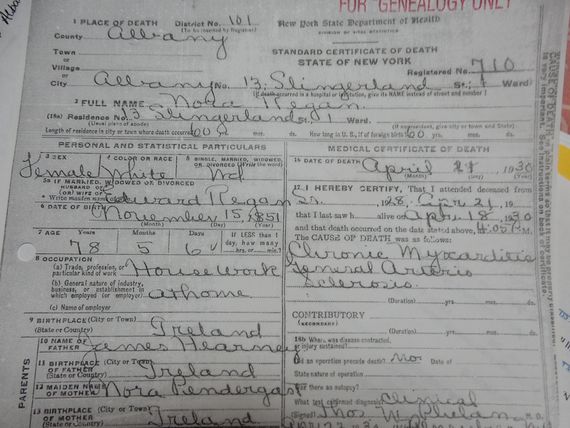
Nora Regan's death certificate names her parents James Hearney and Nora Pendergast and states that they were all born in Ireland.
Kate’s great grandmother Nora Regan’s death certificate gives the names of her parents as James Hearney and Nora Pendergast and says that both were born in Ireland. What a fantastic find! Unfortunately, death certificates for individuals born in Ireland seldom include the name of the county in Ireland where they were born, let alone the name of the townland.
And by the way, don’t forget the Find A Grave and BillionGraves websites. Both host millions of cemetery gravestone records that have been voluntarily entered by individuals who want to help others “chase” their ancestors. Historic newspapers are great sources for obituaries and social news regarding your ancestors. Genealogy Bank and Newspapers.com are excellent subscription websites, but also look for free state historic newspaper websites (e.g. NYS Historic Newspapers).
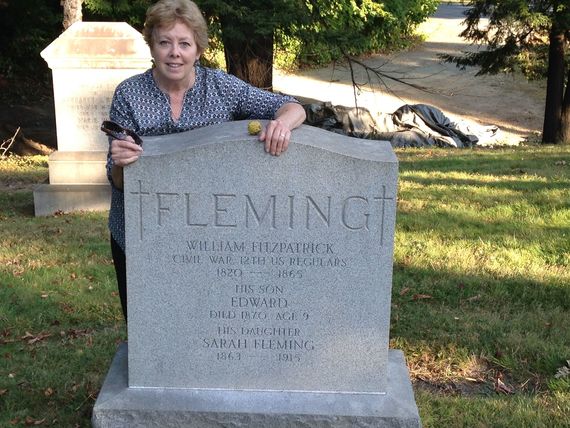
Kate memorialized her great grandfather William Fitzpatrick whose name did not appear on his daughter Sarah's family gravestone. William served in the 12th U.S. Regulars during the Civil War.
If some of your Irish male ancestors immigrated prior to 1862, then it is likely they served in either the Union or Confederate Army during the U.S. Civil War. For a fee, you can request Civil War records from the National Archives. The records for one of Mike’s ancestors (Matthew Whelan) stated that he was from Littermore, Blackwater, Co. Wexford, Ireland. What a miraculous find! As for Kate, she discovered that her great grandfather William Fitzpatrick served in the Civil War and was buried in one of his daughter’s family plot. His name was not on the gravestone, but thanks to his great granddaughter Kate, his name and Union Army Unit now are engraved on the stone. Kate’s way to memorialize an ancestor who’s records were “lost in time” for 150 years.
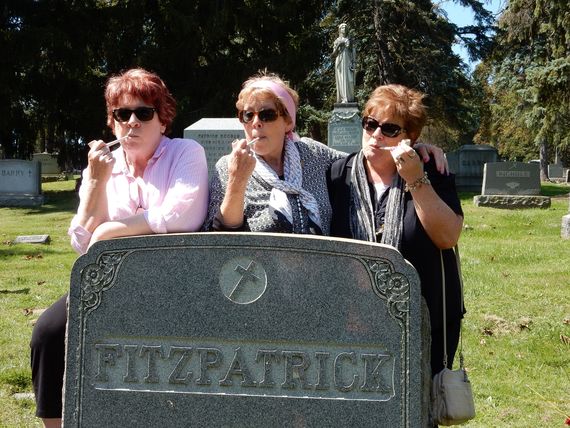
Kate (center) and her sisters Marilee (left) and Peggy smoke Irish clay pipes at the Fitzpatrick family gravestone. Kate and Marilee bought the clay pipes at the Claypipe Visitor Center in Knockcroghery, Co. Roscommon, Ireland.
Once you have exhausted the search for your Irish American ancestors in the U.S., then you are ready to “chase” them in Ireland. If you have determined the names and approximate dates of birth for your immigrant ancestors, as well as the names of their parents and/or siblings, then you have a good chance to find the townlands in Ireland where they lived.
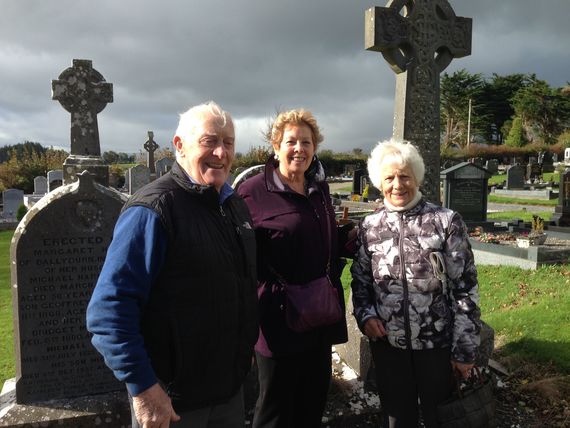
Kate (center) and her distant cousins Mick and Anna Harney in front of a Harney gravestone in the All Saints Catholic Church cemetery in Newtown, Co. Waterford.
We have both been extremely successful in “chasing” many of our Irish ancestors back to their “roots” in Ireland. We have spent many exceptional and emotional days visiting and sharing family history with distant cousins in Counties Waterford, Wexford and Wicklow. They are always as excited about being found by us as we are about finding them!
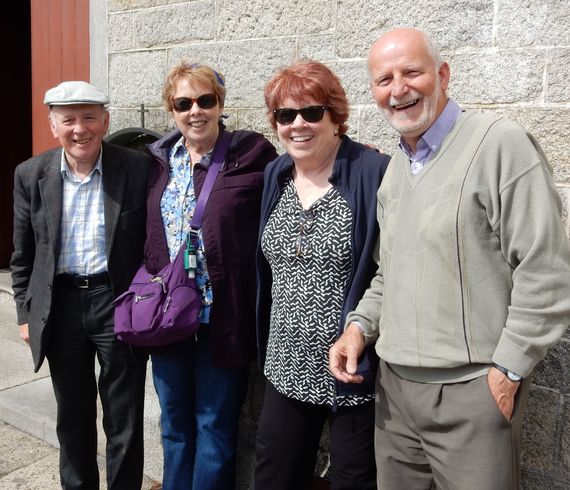
Distant cousins take time for a photo in front of St. Mary's Church in Enniskerry, Co. Wicklow. From left to right (James Byrne, Kate, Marilee, Patsy Byrne).
* Kate and Mike Lancor live in Moultonborough, NH and enjoy “chasing” their own Irish ancestors as well as helping others “chase” theirs. They run a genealogy search business and can be reached by emailing [email protected] or on their Old Friends Genealogy Facebook page. They have traveled to Ireland six times and especially enjoy “chasing” Irish ancestors for their clients. If you have “hit a brick wall” or simply don’t have time to “chase” your ancestors, then send them an email to see if they can help.
* This article was originally published in 2018, updated in 2025.
This article was submitted to the IrishCentral contributors network by a member of the global Irish community. To become an IrishCentral contributor click here.
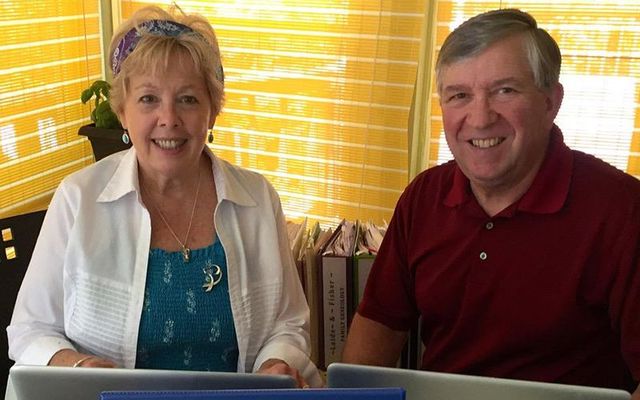

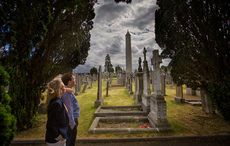
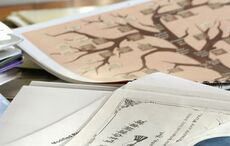
Comments